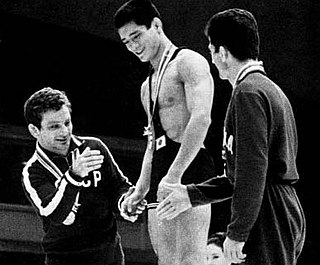The men's Greco-Roman light heavyweight was one of thirteen wrestling events held as part of the wrestling at the 1928 Summer Olympics programme. The competition was held from August 2 to 5, and featured 17 wrestlers from 17 nations. Light heavyweight was the second heaviest category, including wrestlers weighing 75 to 82.5 kilograms.
The men's Greco-Roman heavyweight was one of thirteen wrestling events held as part of the wrestling at the 1928 Summer Olympics programme. The competition was held from August 2 to 5, and featured 15 wrestlers from 15 nations. Heavyweight was the heaviest category, including wrestlers weighing over 82.5 kilograms (181.9 lb).
The men's Greco-Roman featherweight competition at the 1932 Summer Olympics in Los Angeles took place from 5 August to 7 August at the Grand Olympic Auditorium. Nations were limited to one competitor. This weight class was limited to wrestlers weighing up to 87kg.
The men's Greco-Roman heavyweight competition at the 1932 Summer Olympics in Los Angeles took place from 4 August to 7 August at the Grand Olympic Auditorium. Nations were limited to one competitor. This weight class was not limited by maximum weight and was open to wrestlers above 87kg.
The men's Greco-Roman bantamweight competition at the 1936 Summer Olympics in Berlin took place from 6 August to 9 August at the Deutschlandhalle. Nations were limited to one competitor. This weight class was limited to wrestlers weighing up to 56kg.
The men's Greco-Roman heavyweight competition at the 1956 Summer Olympics in Melbourne took place from 3 December to 6 December at the Royal Exhibition Building. Nations were limited to one competitor. Heavyweight was the heaviest category, including wrestlers weighing over 87 kilograms (191.8 lb).
The men's Greco-Roman heavyweight competition at the 1960 Summer Olympics in Rome took place from August 26 to 31 at the Basilica of Maxentius. Nations were limited to one competitor. Heavyweight was the heaviest category, including wrestlers weighing over 87 kilograms (191.8 lb).

The men's Greco-Roman flyweight competition at the 1964 Summer Olympics in Tokyo took place from 16 to 19 October at the Komazawa Gymnasium. Nations were limited to one competitor. Flyweight was the lightest category, including wrestlers weighing 52 kilograms (114.6 lb).

The men's Greco-Roman bantamweight competition at the 1964 Summer Olympics in Tokyo took place from 16 to 19 October at the Komazawa Gymnasium. Nations were limited to one competitor. Bantamweight was the second-lightest category, including wrestlers weighing 52 to 57 kilograms.
The men's Greco-Roman featherweight competition at the 1964 Summer Olympics in Tokyo took place from 16 to 19 October at the Komazawa Gymnasium. Nations were limited to one competitor. Featherweight was the third-lightest category, including wrestlers weighing 57 to 63 kilograms.
The men's Greco-Roman lightweight competition at the 1964 Summer Olympics in Tokyo took place from 16 to 19 October at the Komazawa Gymnasium. Nations were limited to one competitor. Lightweight was the fourth-lightest category, including wrestlers weighing 57 to 63 kilograms.
The men's Greco-Roman welterweight competition at the 1964 Summer Olympics in Tokyo took place from 16 to 19 October at the Komazawa Gymnasium. Nations were limited to one competitor. Welterweight was the third-heaviest category, including wrestlers weighing 70 to 78 kilograms.
The men's Greco-Roman middleweight competition at the 1964 Summer Olympics in Tokyo took place from 16 to 19 October at the Komazawa Gymnasium. Nations were limited to one competitor. Middleweight was the third-heaviest category, including wrestlers weighing 78 to 87 kilograms.
The men's Greco-Roman light heavyweight competition at the 1964 Summer Olympics in Tokyo took place from 16 to 19 October at the Komazawa Gymnasium. Nations were limited to one competitor. Light heavyweight was the second-heaviest category, including wrestlers weighing 87 to 97 kilograms.

The men's freestyle flyweight competition at the 1964 Summer Olympics in Tokyo took place from 11 to 14 October at the Komazawa Gymnasium. Nations were limited to one competitor. Flyweight was the lightest category, including wrestlers weighing up to 52 kilograms (114.6 lb).
The men's freestyle bantamweight competition at the 1964 Summer Olympics in Tokyo took place from 11 to 14 October at the Komazawa Gymnasium. Nations were limited to one competitor. Bantamweight was the second-lightest category, including wrestlers weighing 52 to 57 kilograms.

The men's freestyle featherweight competition at the 1964 Summer Olympics in Tokyo took place from 11 to 14 October at the Komazawa Gymnasium. Nations were limited to one competitor. Featherweight was the third-lightest category, including wrestlers weighing 57 to 63 kilograms.

The men's freestyle lightweight competition at the 1964 Summer Olympics in Tokyo took place from 11 to 14 October at the Komazawa Gymnasium. Nations were limited to one competitor. Lightweight was the fourth-lightest category, including wrestlers weighing 63 to 70 kilograms.
The men's freestyle light heavyweight competition at the 1964 Summer Olympics in Tokyo took place from 11 to 14 October at the Komazawa Gymnasium. Nations were limited to one competitor. Light heavyweight was the second-heaviest category, including wrestlers weighing 87 to 97 kilograms.
The men's freestyle heavyweight competition at the 1964 Summer Olympics in Tokyo took place from 11 to 14 October at the Komazawa Gymnasium. Nations were limited to one competitor. Heavyweight was the heaviest category, including wrestlers weighing over 97 kilograms (213.8 lb).





